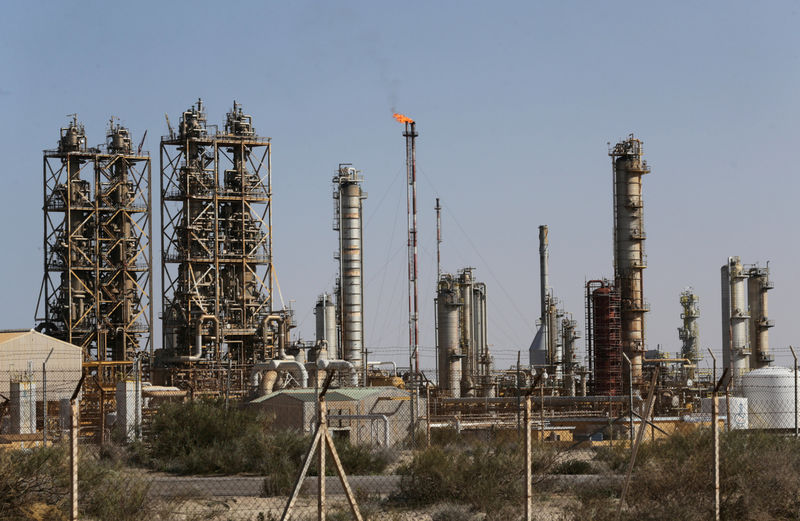By Ahmad Ghaddar and Libby George
LONDON (Reuters) - OPEC's battle against an oil glut is under threat as unsold crude from members Nigeria and Libya, which are exempt from a global production-cutting deal, is swamping the Atlantic Basin.
Nigeria has more than 60 million barrels of unsold crude, traders of its oil said, surpassing the level reached when global oversupply peaked two years ago. More export plans are a week away, likely bringing more than 50 million extra barrels.
Libya, meanwhile, is pouring nearly triple the amount of crude into global markets compared with last year.
Few expected the two nations' output to rebound so quickly, and it could scupper OPEC's plans to lift oil prices out of a nearly three-year-long slump.
The 14-nation Organization of the Petroleum Exporting Countries two weeks ago extended a deal struck in December with several non-member oil producers to cut output by 1.8 million barrels per day (bpd) from levels seen late last year.
But OPEC also renewed exemptions for Libya and Nigeria, which have struggled with output-sapping internal conflict. Those struggles, however, are abating.
"They've added 600,000 barrels per day between the two of them" since the original deal was struck, said Amrita Sen of consultancy Energy Aspects. "And that's half the OPEC cuts."
Royal Dutch Shell (L:RDSa) this week lifted force majeure on Nigeria's Forcados crude, bringing the country's oil exports fully online for the first time in 16 months and cementing the addition of some 250,000 bpd to world markets.
Libyan oil production hit its highest since October 2014 at 835,000 bpd this month, despite the brief shutdown of Sharara, the country's largest oilfield, due to protests.
Despite this, OPEC sources said calls to bring Libya or Nigeria into the cuts never garnered enough support. OPEC Secretary-General Mohammad Barkindo said this month it was too early for those countries to be considered for output curbs.
But the excess is palpable – and it's pouring straight into the Atlantic Basin, home of the physical crude grades that underpin the global Brent benchmark.
"In a physical sense, it's pretty dire," one West African oil trader said. "Everything is on offer, and everything is pumping."
Traders said some Mediterranean refiners - typically reliable consumers - were reselling their oil.
A Mediterranean trader said that while Libya "is not a totally reliable source", its production was "running high on several fields".
There are doubts over whether the two nations will maintain their run, particularly given Libya's political problems.
But Brent futures (LCOc1) are trading nearly 20 percent below their 2017 high, and more than 10 percent below the level before the May OPEC meeting.
"The biggest issue is light, sweet crude," Sen said, adding the Atlantic Basin is "awash" with it. "This is where OPEC isn't light enough on its feet ... the benchmarks are all light sweet. And the cuts are medium and sour."
Even barrels from the United States are sailing east, looking for homes in Europe and Asia and further undermining the global benchmark. The dynamic, traders and analysts said, pointed to a need for more from OPEC.
"This means the rest of the group will see the call on their crude falling - it's very simple," FGE analyst James Davis said. "They need to cut deeper in order to maintain the status quo."
Nigerian oil production rebounds http://reut.rs/2sKbLOv
Libya oil tanker exports http://reut.rs/2sciXCM

Libya oil production (mln bpd) http://reut.rs/2rHYoAc